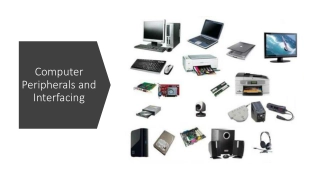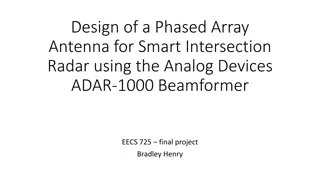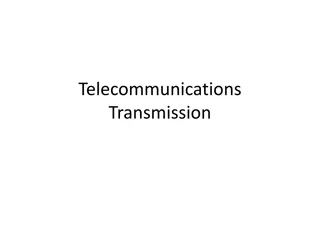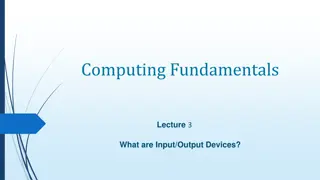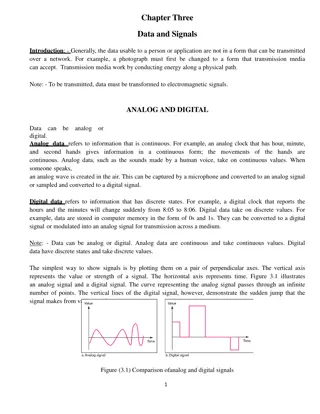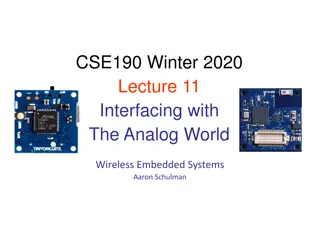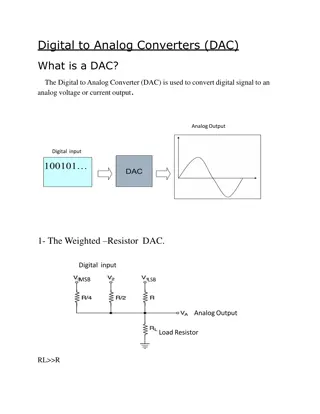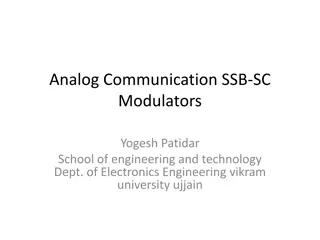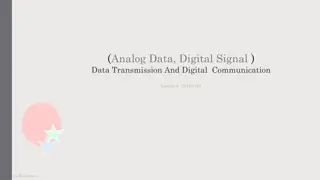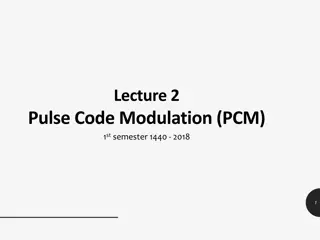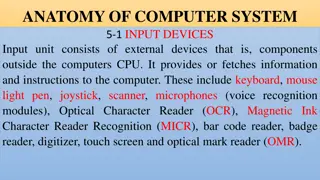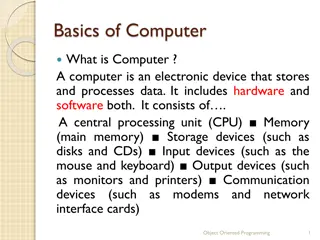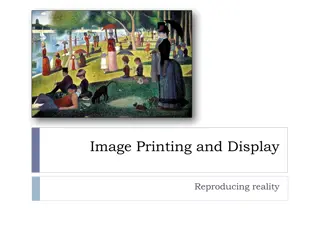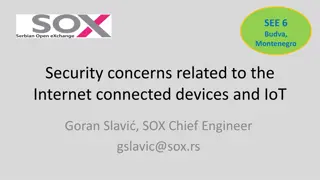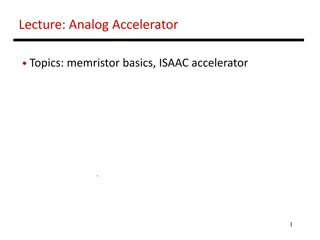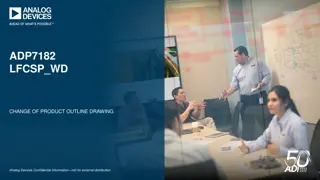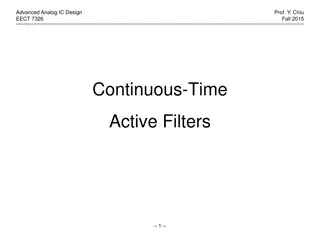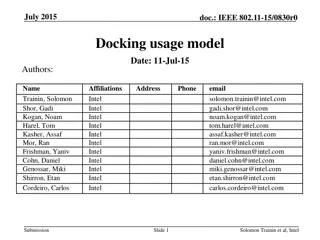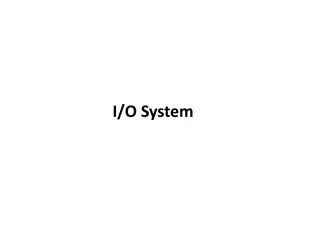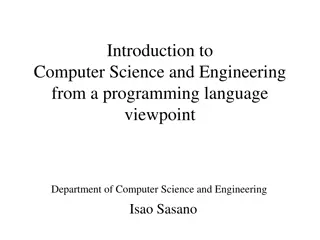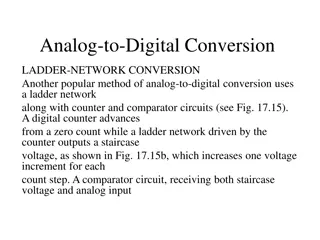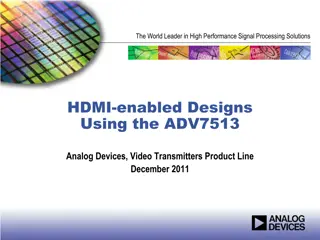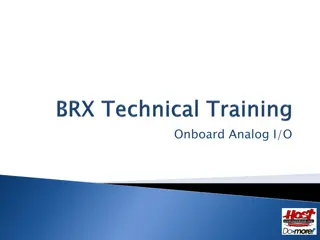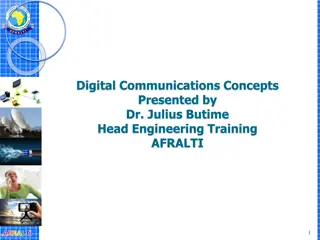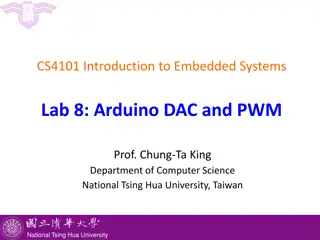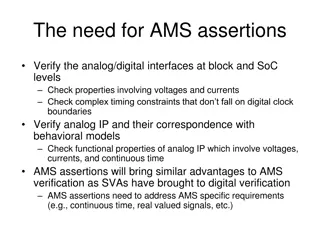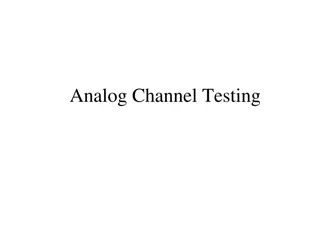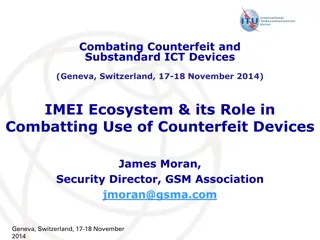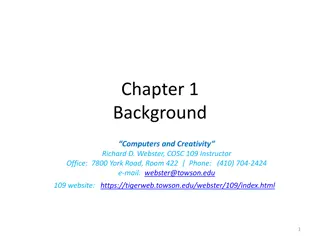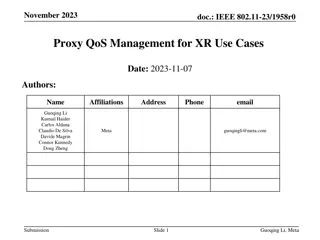ANALOG AND DIGITAL ELECTRONICS 21CS33
Explore the world of analog and digital electronics through the lens of registers, counters, and flip-flops. Dive deep into the operation of these components, learn how to transfer data between registers, build and analyze shift registers, construct timing diagrams, and understand binary counters. D
0 views • 112 slides
Computer Peripherals and Interfacing
Computer peripherals are external devices that enhance the functionality of a computer. They include input devices like keyboards and mice, output devices like printers and monitors, and storage devices like hard disk drives and solid-state drives. Interfacing circuits connect these peripherals to t
1 views • 6 slides
Phased Array Antenna Design for Smart Intersection Radar Using Analog Devices ADAR-1000
Designing a phased array antenna system for a smart intersection radar project utilizing the Analog Devices ADAR-1000 beamformer. The system involves 4 independent phased arrays covering key directions in the intersection, with considerations for beam steering, beamwidth, and array configuration. Ke
0 views • 9 slides
Possible Analog States of the Hoyle State in Heavier Nuclei
Research conducted at the National Research Centre, Kurchatov Institute, explores possible analogs of the Hoyle state in heavier 4N nuclei, focusing on the 7.65 MeV 0+2 state in 12C (Hoyle state). The study reveals insights into the structure and characteristics of the Hoyle state, crucial for under
0 views • 12 slides
Understanding Interpolation and Pulse Shaping in Real-Time Digital Signal Processing
Discrete-to-continuous conversion, interpolation, pulse shaping techniques, and data conversion in real-time digital signal processing are discussed in this content. Topics include types of pulse shapes, sampling, continuous signal approximation, interpolation methods, and data conversion processes
4 views • 14 slides
Analog Circuits and Labs Lecture Schedule at IIT Bombay
Lecture schedule and course materials for EE204 Analog Circuits and EE230 Analog Labs delivered by Assistant Professor Sandip Mondal at IIT Bombay. The grading system, class note submission guidelines, attendance rules, and classroom discipline expectations are outlined for the course. Students are
4 views • 17 slides
Understanding Network Devices and Connectivity
Network devices play a crucial role in connecting computers and printers to networks, facilitating fast and secure data transfer. These devices, such as network interface cards and WiFi cards, help devices communicate effectively on the same or different networks. MAC addresses uniquely identify dev
6 views • 31 slides
Analog Computer Simulation of Mechanical Oscillations with Damping
Explore the analog computer simulation of mechanical oscillations with and without damping in a physics-themed project. Students can visualize classical physics concepts through hands-on analog circuit design, modeling spring-mass systems and RLC circuits. The project involves constructing a breadbo
0 views • 11 slides
Understanding Telecommunications Transmission Systems
Transmission systems in telecommunications provide circuits between network nodes using channels for bidirectional communication. Channels can range from simple audio circuits to complex satellite systems. Signals can be analog or digital, each with its unique characteristics. Bandwidth is crucial f
0 views • 32 slides
Understanding Input and Output Devices in Computing
In computing, input and output devices play a crucial role in enabling communication between users and computers. Input devices are used to enter data into a computer, while output devices display or provide the results of processed information. Common input devices include keyboards, mice, and joys
0 views • 17 slides
Understanding Data and Signals in Networks
Data transmission involves converting information into electromagnetic signals for communication. Analog data is continuous, like a clock's hands, while digital data is discrete, like binary code in computer memory. Signals can be analog or digital, periodic or non-periodic, with characteristics lik
0 views • 17 slides
Interfacing with Analog Signals in Embedded Systems
Exploring the conversion of analog signals from the physical world into electrical signals using transducers in embedded systems. Learn about going from analog to digital representation, choosing sample rates, the Shannon-Nyquist sampling theorem, importance of anti-aliasing filters, and the necessi
0 views • 18 slides
Automotive Grade 10 Joining Methods: Locking Devices Overview
Automotive Grade 10 explores joining methods using locking devices to prevent nuts from loosening due to movement and vibration. Friction-locking devices include lock nuts, stiff nuts, and special washers. Positive-locking devices tighten nuts securely with slotted nuts, crowned nuts, tab washers, a
1 views • 7 slides
Understanding Digital to Analog Converters (DAC) and Their Applications
Digital to Analog Converters (DAC) are essential components used to convert digital signals into analog voltage or current outputs. This article explains the working principle of DACs, provides examples of different types such as Weighted Resistor DAC, R-2R Ladder DAC, Feedback Amplifier DAC, and Si
0 views • 9 slides
Understanding SSB-SC Modulation in Analog Communication
Single Sideband Suppressed Carrier (SSB-SC) modulation is a technique in analog communication that transmits a single sideband along with the carrier signal, offering advantages such as reduced bandwidth consumption, increased signal transmission capacity, and lower noise interference. However, the
0 views • 9 slides
Understanding Analog Data and Digital Signal Transmission
This lecture delves into the concepts of analog data, digital signals, and the processes involved in data transmission and digital communication. It covers topics such as Pulse Amplitude Modulation (PAM), Analog-to-Digital Conversion, and Sampling. The conversion of analog signals to digital signals
0 views • 34 slides
Understanding Pulse Code Modulation (PCM) in Analog to Digital Conversion
This content delves into the realm of Pulse Code Modulation (PCM), outlining its significance in converting analog data to digital signals. It covers the process of Analog to Digital Conversion, emphasizing the advantages of digitizing analog signals for improved quality and reduced noise. The steps
0 views • 14 slides
Overview of Computer Input and Output Devices
Input devices of a computer system consist of external components like keyboard, mouse, light pen, joystick, scanner, microphone, and more, that provide information and instructions to the computer. On the other hand, output devices transfer information from the computer's CPU to the user through de
0 views • 11 slides
Understanding Analog and Digital Systems in Telecommunications
Analog systems involve altering a base carrier's frequency to encode information, while digital systems represent data as strings of 0s and 1s. Prof. Ashish Shah explains the concepts in a clear and informative manner, highlighting the differences between analog and digital technologies in telecommu
0 views • 33 slides
Understanding Basics of Computer Systems
A computer is an electronic device that stores and processes data using hardware and software components. It consists of a CPU, memory, storage devices, input/output devices, and communication devices. The CPU includes a Control Unit and Arithmetic Logic Unit, and the memory stores data in bytes. St
0 views • 57 slides
Understanding Image Display and Halftoning Techniques
Images are reproduced for display on various devices like televisions, computer monitors, and newspapers with specific characteristics such as pixel shape, spatial resolution, and color depth. Issues with display devices, such as pixel resolution and color depth, affect fidelity. Halftoning methods,
3 views • 44 slides
Security Concerns and Future Challenges of Internet Connected Devices in Budva, Montenegro
With the increasing number of Internet-connected devices and IoT, the security concerns are escalating. In the past, communication was restricted to servers and terminals, but now everyone is connected globally. The future poses even greater risks with IoT becoming prevalent. Reasons for concern inc
0 views • 17 slides
Analog Accelerator: Memristor Basics and ISAAC Accelerator
Explore the world of analog acceleration with topics covering memristor basics and the ISAAC accelerator. From understanding noisy analog phenomena to leveraging wires as ALUs, delve into crossbars for vector-matrix multiplication and the challenges of high ADC/DAC area/energy. Discover solutions li
0 views • 23 slides
Analog Devices Product Outline Drawings Comparison
This content compares three different product outline drawings from Analog Devices, focusing on the differences in exposed paddle length and width, as well as the Pin1 indicator. It provides detailed information on the CP-8-5 and CP-8-13 packages, highlighting key specifications and dimensions. The
0 views • 4 slides
Understanding Advanced Analog IC Design and Filtering Techniques
Exploring the world of Advanced Analog IC Design through the concepts of continuous-time active filters, frequency domains, time domains, filter specifications, and examples of passive RLC filters. Delve into the intricacies of different filter types, such as low-pass, high-pass, and band-pass, to e
0 views • 60 slides
Overview of Communication Systems: Signal vs. Noise
Communication systems involve a battle between signal and noise/distortion, with information represented in analog or digital form. Analog signals include speech, music, and temperature readings, while digital signals can represent text and computer data. The history of analog and digital messages,
0 views • 17 slides
Wireless Office Docking Model for Multiple Devices
This document outlines a usage model for office docking involving wireless connections between mobile devices and various peripheral devices such as monitors, hard drives, printers, and more. It describes scenarios for single and multiple devices in both home and office settings, emphasizing the nee
0 views • 5 slides
Understanding I/O Systems and Devices
I/O systems and devices play a crucial role in computer operations. They can be categorized into block devices and character devices based on their functionalities. Block devices store information in fixed-size blocks with addresses, while character devices handle character streams. Some devices, li
0 views • 19 slides
Overview of Computer Science: From Analog to Digital Computing
Explore the evolution of computing from analog devices like sundials and slide rules to mechanical digital computers by Charles Babbage, and the groundbreaking ENIAC - the first general-purpose digital computer. Delve into the concept of encoding information in digital computers using binary numbers
0 views • 42 slides
Gait Device Selection for Children with Lumbar Level Myelomeningocele
This presentation discusses the considerations and choices of gait devices for children with lumbar level myelomeningocele. It covers the specific needs of pediatric patients, benefits and drawbacks of various devices, funding requirements, and clinical application through case studies. The material
0 views • 31 slides
Analog-to-Digital Conversion Using Ladder Network
Another popular method of analog-to-digital conversion involves the use of a ladder network in conjunction with counter and comparator circuits. In this method, a digital counter progresses from zero while the ladder network driven by the counter generates a staircase voltage pattern, incrementing b
0 views • 6 slides
High Performance Signal Processing Solutions with ADV7513 Analog Devices
ADV7513 by Analog Devices is a leading HDMI-enabled video transmitter product line offering extended colorimetry, 3D support, low standby power, and integrated CEC interpretation. Key features include support for display resolutions up to 1080p, HDCP encryption, and flexible video inputs. Reference
0 views • 40 slides
Advanced Configurable Analog I/O Modules for Automation Systems
Explore a range of onboard analog I/O modules including BX10, BX18, and BX36 series, each offering high-speed discrete inputs and outputs along with analog input and output options. These modules are fully configurable with flexible voltage and current ranges. Additionally, learn about the new memor
0 views • 7 slides
Understanding Analog and Digital Communications Concepts
Exploring the differences between analogue and digital signals, this content presents a comprehensive overview. It covers the definitions of analog, the prevalence of analog signals in our surroundings, and the advantages of digital communication such as error correction, encryption, and data proces
0 views • 13 slides
Introduction to Arduino DAC and PWM in Embedded Systems Lab
Explore the practical application of Arduino's digital-to-analog converter (DAC) and pulse width modulation (PWM) techniques through projects involving RGB LED modules, analog joysticks, and stepper motors. Learn to control RGB LED colors, read analog joystick input values, and operate stepper motor
0 views • 10 slides
Advancing AMS Assertions for Analog/Digital Interface Verification
AMS assertions play a crucial role in verifying analog/digital interfaces, checking properties related to voltages, currents, and complex timing constraints. They bring advantages similar to SVAs in digital verification, addressing specific AMS requirements. Examples showcase comparisons of voltage/
0 views • 11 slides
Overview of Analog Channel Testing and Parametric Analysis
Explore the world of analog channel testing, types of analog channels, AC parametric tests, gain and level testing, and more. Understand the components involved, critical measurements like absolute voltage levels, and ways to detect circuit defects efficiently. Dive into the nuances of AC circuit pe
0 views • 60 slides
Combatting Counterfeit and Substandard ICT Devices: IMEI Ecosystem & Its Role
The conference held in Geneva, Switzerland in November 2014 addressed the critical issue of combatting counterfeit and substandard ICT devices, focusing on the IMEI ecosystem and its significance in preventing the use of counterfeit devices. James Moran, Security Director at GSM Association, highlig
0 views • 12 slides
Understanding Digital and Analog Information in Computers
Explore the concepts of digital and analog information in computers through examples like thermometers, sound, and sight. Learn how computers process discrete digital data compared to continuous analog information, and why understanding both is essential in digital media courses. Delve into the conv
0 views • 49 slides
Proxy QoS Management for XR Devices in IEEE 802.11-23/1958r0 - November 2023
This document discusses the challenges faced by XR devices in terms of size, thermal constraints, cost, and power limitations leading to the proposal of Proxy QoS Management to enhance Wi-Fi performance. The aim is to leverage TGbn devices for improving legacy devices' connectivity within a Wi-Fi ne
0 views • 6 slides

